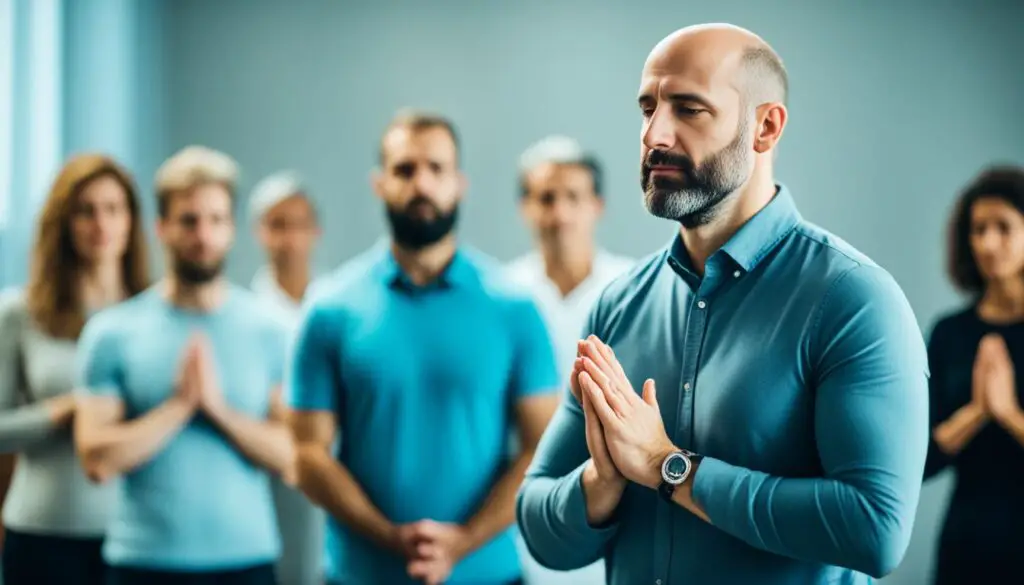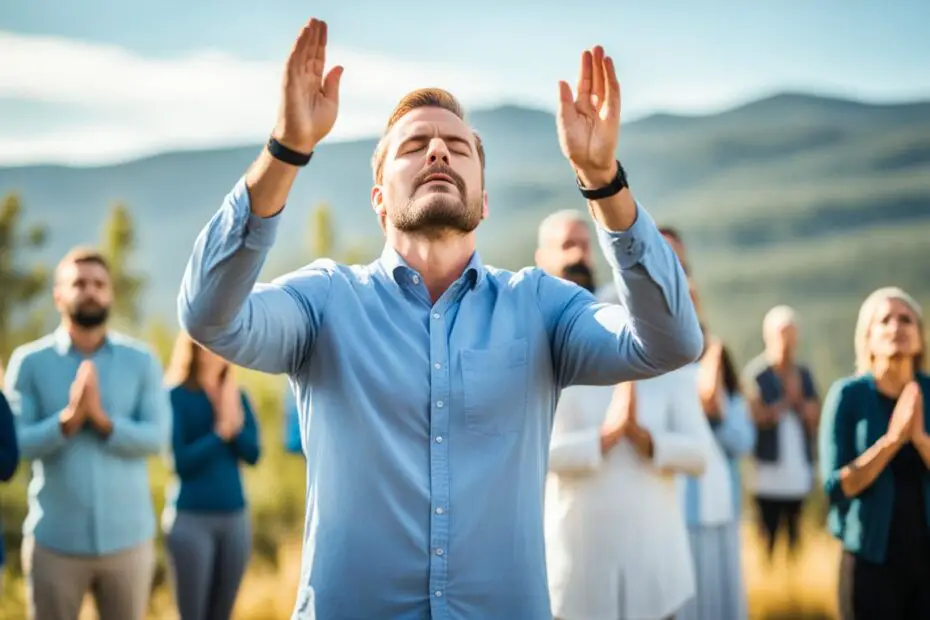As a prayer leader, you have the important role of guiding and nurturing the spiritual growth of your congregation. Your responsibilities encompass leading prayer services, organizing prayer groups, and guiding meditation practices. You also have the privilege of conducting religious ceremonies and inspiring and motivating participants through your leadership. Additionally, you are tasked with preparing and delivering sermons that enlighten and engage the members of your community.
A crucial aspect of your role as a prayer leader is fostering a sense of community within the congregation. By offering counseling and support, you help individuals feel valued and cared for. Your dedication to supporting the spiritual well-being of your community brings people together and strengthens their faith.
Key Takeaways:
- Leading prayer services and organizing prayer groups are important responsibilities of a prayer leader.
- Guiding meditation practices helps facilitate spiritual growth within the congregation.
- Conducting religious ceremonies and delivering sermons inspire and motivate participants.
- A prayer leader fosters a sense of community by offering counseling and support to individuals.
- By fulfilling these responsibilities, a prayer leader contributes to the spiritual well-being of the congregation.
Importance of Prayer in Christian Discipleship
In the journey of Christian discipleship, prayer holds immense significance. As a spiritual practice, prayer is a powerful tool that connects individuals with God, nurturing their faith and deepening their relationship with Him.
A prayer leader plays a pivotal role in helping the congregation understand and embrace the importance of prayer. They actively work towards strengthening the prayer life within the community, creating an environment that fosters spiritual growth and transformation.
As a prayer advocate, the prayer leader encourages and promotes an active and growing prayer life among the members. They understand the tremendous impact that consistent and heartfelt prayer can have on individuals and the community as a whole.
To facilitate the development of a vibrant prayer life, the prayer leader coordinates the planning and implementation of a comprehensive prayer ministry within the congregation. This involves identifying individuals who have a passion for prayer and supporting them in their journey of praying for various aspects of congregational life.
In addition to prayer ministry, the prayer leader is actively involved in teaching prayer. They recommend appropriate resources and provide guidance on different prayer techniques, catering to all age levels and faith stages. By equipping the congregation with the knowledge and skills necessary for effective prayer, the prayer leader empowers individuals to connect with God on a deeper level.
Moreover, the prayer leader fosters community involvement by establishing connections with organizations, individuals, and resources that emphasize Christian prayer. By engaging with the broader community, the prayer leader encourages collaboration, outreach, and a shared dedication to prayer as an integral part of Christian discipleship.
The importance of prayer in Christian discipleship cannot be overstated. It shapes individuals’ spiritual journeys, strengthens their faith, and builds a sense of unity within the congregation. As a prayer leader, the influence and guidance they provide pave the way for a thriving and transformative prayer life that benefits both individuals and the entire community.
- Prayer is essential in Christian discipleship as it deepens the connection with God and nurtures faith.
- A prayer leader plays a vital role in promoting an active and growing prayer life among the congregation.
- They coordinate a comprehensive prayer ministry, supporting individuals praying for various aspects of congregational life.
- The prayer leader teaches prayer and recommends resources to facilitate spiritual growth at all stages of faith.
- Community involvement and collaboration are fostered through connections with other prayer-focused entities.
Responsibilities of a Prayer Leader
A prayer leader plays a vital role in the congregation, not only in leading prayer services but also in growing and nurturing the spiritual life of the community. They have a range of responsibilities aimed at equipping and supporting individuals in their prayer journey and fostering a sense of community through comprehensive prayer ministry and outreach activities.
1. Growing Spiritual Life
As a prayer leader, one of the essential responsibilities is to maintain a growing and healthy spiritual life themselves. By setting an example, they inspire others to cultivate their own spiritual growth and deepen their relationship with God.
2. Comprehensive Prayer Ministry
The prayer leader collaborates with others to plan and implement a comprehensive prayer ministry within the congregation. This involves identifying individuals who are dedicated to praying for different aspects of congregational life, such as worship services, ministry activities, and community outreach. They equip and support these prayer warriors, recognizing the importance of collective spiritual intercession.
3. Equipping and Supporting People
A prayer leader is familiar with curriculum resources for teaching prayer. They facilitate the use of these resources and recommend appropriate materials tailored to different age groups and faith stages. By equipping and supporting people through prayer education, the prayer leader enables individuals to develop a robust prayer life and deepen their spiritual connection.
4. Coordinating Prayer Activities
The prayer leader also plays a crucial role in coordinating various prayer activities and events within the congregation and the wider community. This includes organizing prayer meetings, prayer vigils, and retreats that effectively engage the community in prayerful experiences. Their coordination ensures a structured and meaningful prayer-focused environment for all participants.
5. Community Outreach
Beyond the congregation, the prayer leader promotes community outreach initiatives related to prayer. They actively engage with organizations, individuals, and resources that share a passion for Christian prayer, fostering connections and collaborations that extend the impact of prayer to the broader community.
By assuming these responsibilities, the prayer leader plays a pivotal role in cultivating a growing spiritual life, leading a comprehensive prayer ministry, and actively supporting the community in their prayer journey. Through their guidance and dedication, they facilitate spiritual development, foster community engagement, and encourage individuals to embrace the transformative power of prayer.
Qualifications and Skills of a Prayer Leader
A prayer leader is entrusted with the important task of guiding and nurturing the spiritual growth of a congregation. To effectively fulfill this role, there are specific qualifications and skills that are essential:
Spiritual Gifts: A prayer leader benefits from a range of spiritual gifts that enable them to serve the community effectively. These gifts include servanthood, teaching, exhortation (encouragement), wisdom, discernment, administration, and helping.
Active Prayer Life: A prayer leader should have an active and growing prayer life themselves. Their personal connection with God through prayer sets an example for others and encourages them to develop their own prayer lives.
Teaching and Communication Skills: A prayer leader should possess strong teaching and communication skills. They should be able to articulate the importance of prayer and effectively convey the teachings and principles of prayer to individuals of all ages and backgrounds.
Teamwork: Collaboration and teamwork are crucial qualities for a prayer leader. They need to work well with other ministry leaders, coordinating efforts and supporting one another in fostering a culture of prayer within the community.
Organizational Abilities: A prayer leader should demonstrate strong organizational abilities. They are responsible for coordinating teams and tasks related to prayer activities, ensuring everything is well-planned and carried out efficiently.
Empathy: An essential quality of a prayer leader is empathy. They should genuinely care about the hopes and concerns of the people in the community, listening attentively and responding with compassion.
Counseling Skills: A prayer leader should possess counseling skills to provide guidance and support to individuals in need. They should be able to offer spiritual counseling, helping others navigate challenges and find solace in prayer.
“A prayer leader must possess a genuine desire to connect with others, help them grow spiritually, and foster a deep and meaningful prayer life. Through their spiritual gifts, active prayer life, teaching and communication skills, teamwork, organizational abilities, empathy, and counseling skills, they play a vital role in guiding and nurturing the congregation’s spiritual journey.”
With these qualifications and skills, a prayer leader can effectively fulfill their responsibilities, leading the congregation towards a more vibrant and connected prayer community.
Table 4: Qualifications and Skills of a Prayer Leader
| Qualifications | Skills |
|---|---|
| Spiritual Gifts | – Servanthood – Teaching – Exhortation (Encouragement) – Wisdom – Discernment – Administration – Helping |
| Active Prayer Life | – Personal connection with God – Role model for others |
| Teaching and Communication Skills | – Articulate the importance of prayer – Effective communication of prayer principles |
| Teamwork | – Collaboration with ministry leaders – Support for fellow leaders |
| Organizational Abilities | – Coordination of prayer activities and teams |
| Empathy | – Genuine care for community members – Active listening |
| Counseling Skills | – Spiritual guidance and support |

Conclusion
A prayer leader plays a vital role in the religious community, serving as a guide and source of spiritual support. They lead prayer services, organize prayer groups, and provide guidance during meditation practices. By conducting religious ceremonies and leading worship sessions, they create an atmosphere of inspiration and motivation. The prayer leader also prepares and delivers sermons, fostering a sense of community among the congregation.
One of the most important responsibilities of a prayer leader is offering counseling and support to individuals in need. They ensure that everyone feels valued and cared for, providing a safe space for sharing and seeking guidance. Through their dedication and leadership, the prayer leader contributes to the overall spiritual growth and well-being of the congregation.
In addition to their role in spiritual guidance, prayer leaders are instrumental in community building. They foster a sense of unity and belonging among the members, encouraging active participation and collaboration. With their support and encouragement, the congregation can come together to support one another and make a positive impact within their community. Their expertise in worship leadership further enhances the spiritual experience of the congregation, creating meaningful and uplifting worship sessions.
FAQ
What are the responsibilities of a prayer leader?
A prayer leader is responsible for leading prayer services, organizing prayer groups, guiding meditation practices, conducting religious ceremonies, inspiring and motivating participants, leading worship sessions, preparing and delivering sermons, fostering a sense of community, and offering counseling and support.
Why is prayer important in Christian discipleship?
Prayer is important in Christian discipleship because it strengthens the spiritual practice of prayer within the community, deepening the connection with God. It serves as a means of promoting an active and growing prayer life among the members, fostering spiritual growth and well-being.
What is the role of a prayer leader in the prayer ministry?
A prayer leader plays a crucial role in the prayer ministry by coordinating the planning and implementation of a comprehensive prayer ministry within the congregation. They identify, equip, and support individuals who are praying for all aspects of congregational life, and they teach prayer by recommending appropriate resources for different age groups and faith stages.
What qualifications and skills should a prayer leader possess?
A prayer leader should possess spiritual gifts such as servanthood, teaching, encouragement, wisdom, discernment, administration, and helping. They should have an active and growing prayer life, excellent listening and communication skills, strong teamwork abilities, organizational skills, empathy, genuine interest in the hopes and concerns of the community, and counseling skills to offer support and guidance to those in need.
How does a prayer leader contribute to the congregation?
A prayer leader contributes to the congregation by providing spiritual guidance, fostering a sense of community, and offering support and encouragement. They lead prayer services, organize prayer groups, guide meditation practices, conduct religious ceremonies, inspire and motivate participants, lead worship sessions, prepare and deliver sermons, and ensure that everyone feels valued and cared for.









